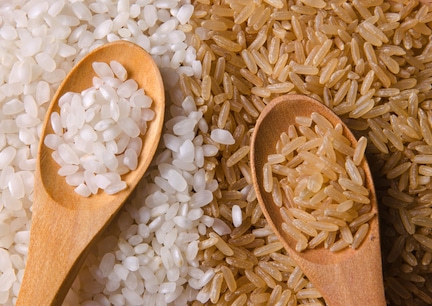Brown rice is a whole grain that’s often considered a healthy food. Unlike white rice, which only contains the starchy endosperm, brown rice retains the nutrient-rich germ and bran layers of the grain. The only part removed is the hard outer hull.
Yet, while it’s higher in several nutrients than white rice, brown rice remains rich in carbs.
Health Benefits of Brown Rice
Brown rice may not appeal to your taste buds, especially if you have been used to white rice. However, the impressive list of its health benefits may just convince you to make slow and steady changes in your diet and strengthen your resolve to get healthier.
It helps in diabetes management
Brown rice can be beneficial for diabetics and hyperglycemic individuals. It has a low glycemic index, which helps reduce insulin surges and assists in the stabilization of blood sugar levels in the body. A comparative study published in the International Journal of Food Sciences and Nutrition revealed that it is rich in phytic acid, fiber, and essential polyphenols. It is a complex carbohydrate that helps in the slower release of sugar as compared to white rice.
It aids digestion
Brown rice is a helpful staple that can be easily added to the daily diet to optimize the digestive system. The fiber present in it helps regulate bowel movements and keeps you feeling full. A study investigating the effects of brown and white rice during digestion found evidence that the bran layer on the former slowed emptying, thus bulking stool. Fiber content also brings relief from other conditions such as constipation and colitis.
It provides antioxidants
According to a 2018 study, the more a grain undergoes milling processes, the more it tends to lose beneficial phytocompounds. Owing to this, the rice is bound to have more phytochemicals that exhibit antioxidant activity, especially when compared to white rice or other heavily processed grains.
The grain is also rich in flavonoids such as flavones and tricin, amongst others, which adds to its antioxidant activity. Antioxidants reduce stress, help get rid of toxins and keep some health conditions at bay.
It helps reduce obesity
Brown rice is one food shown to be instrumental in weight control for many people combating obesity. A study conducted in this regard revealed that whole grains such as brown and black rice, have positive effects on the body concerning a reduction in body mass index and fat. They also enhance the activity of glutathione peroxidase, an antioxidant enzyme linked with elevating the levels of HDL (good) cholesterol in obese individuals. Another comparative animal research study also suggests the anti-obesity effects of the germinated variety.
It has neuroprotective effects
High cholesterol diets have been known to add to the risk of neurodegenerative disorders and impair cognitive performance. This rice can help cut down on cholesterol by replacing it with healthier nutrients such as fiber. A 2016 study concluded that germinated brown rice could offer neuroprotective action, thus protecting the brain from oxidative stress. This makes it especially beneficial for someone who is at risk of diseases such as Parkinson’s or Alzheimer’s.
It improves maternal health
Sprouted brown rice may be beneficial for the mental health of lactating mothers. Brown rice consumption showed positive results in nursing women concerning a reduction in mood disturbances, stages of depression, and fatigue, according to an investigative study in the European Journal of Nutrition. It has also suggested that the consumption of this rice during lactation enhances the body’s ability to resist stress and improves the overall immune defense.
It boosts heart health
The benefits of whole grains over processed food for heart health are not unknown to many. This rice is a step further in maintaining the natural state of the grain. Germinated brown rice is a source of magnesium and proanthocyanidin, which can help reduce cardiovascular complications and also decrease the risk of heart attack and stroke. A Nurses’ Health Study published in The American Journal of Clinical Nutrition also suggests that overall increased intake of whole grains may have a protective effect against coronary heart diseases.
It controls cholesterol levels
This rice has no cholesterol content. It works well as a replacement for any cholesterol-rich options you are looking to cut back on in your diet. An investigative study performed on rats revealed that it possesses hypocholesterolemic qualities, thus regulating cholesterol catabolism. It also contains beneficial nutrients that help in lipid and glucose metabolism. More research is needed, but initial findings are promising regarding brown rice’s role in lowering cholesterol.
It has antidepressant properties
According to one animal study, germinated brown rice may contain anti-depressant qualities that help combat anxiety-related disorders. An investigative study suggested that it contains essential amino acids such as glutamine, glycerin, and GABA. These inhibitory neurotransmitters facilitate a reduction in the allowance of messages associated with anxiety, depression, and stress in the brain, resulting in a relaxed state of well-being. Overall, an easy and healthy diet tends to have a positive effect on your mental health.
It helps to sleep better
While melatonin is already present in your body, if you have trouble getting a good night’s sleep, you can use melatonin-rich foods such as brown rice to fulfill any deficit. A study notes that ‘all fractions of germinated rice are a rich source of melatonin and rice bran fraction is a good source of serotonin revealing the potential use of each milling fraction of rice grain.
It maintains bone health
Brown rice is helpful for the maintenance of healthy bones, as it is rich in magnesium which, along with calcium, provides the bones their physical structure. Magnesium-rich, it may help mitigate bone demineralization and is beneficial for medical conditions such as arthritis and osteoporosis








